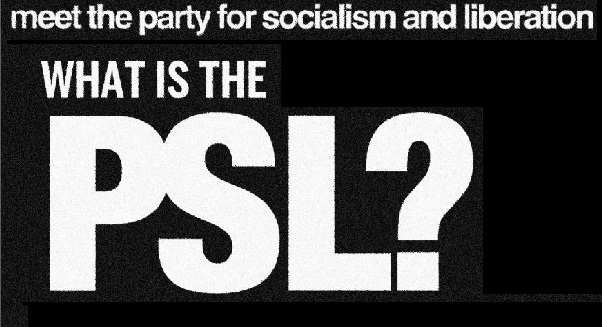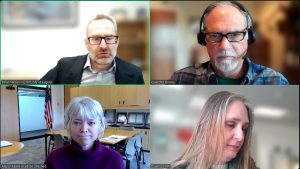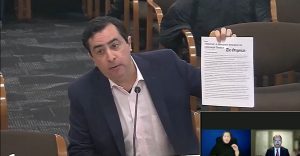PSL brings Marxist lens to ACES, the diverse coalition planning ‘No Kings’ June 14
11 min read
Presenter: The No Kings protest June 14 is being organized by a relatively new group, the Activist Coalition of Eugene Springfield. ACES members share a few common beliefs: They commit to nonviolence, acknowledge the power imbalance caused by white supremacy, and recognize the need to work together in coalition, despite often deep ideological differences.
[00:00:22] One member organization, the Party for Socialism and Liberation, talks about its role June 14 and how and why it’s involved in ACES. The PSL hopes to bring left-wing class-based political analysis into the mainstream. For PSL Eugene, Sam Cook:
[00:00:39] Sam Cook: We are going to be running and operating the Palestine contingent of the No Kings event. For us, the prime contradiction of modern capitalism is imperialism, and we see the ongoing genocide in Palestine as the current and most severe crisis of imperialism in the world today.
[00:01:02] And we recognize the intense importance of maintaining the political pressure and mobilization on behalf of Palestine, even as the genocide continues almost into three years. It’s horrible.
[00:01:18] So what we wanted to do was introduce and make sure that that issue is represented sufficiently and to the level of importance that we recognize it to have at No Kings, especially given what Trump will be doing in D.C. with his ridiculous and audacious military parade, this sort of exercise in militaristic pomp and circumstance.
[00:01:43] And that was part of the motivation for wanting to try to do a mass mobilization on this day. And we figured it would be a major, major disservice to the movement and the incredible visibility that has been raised on the Palestine issue if we didn’t have something very significantly dedicated to the question of Palestine.
[00:02:04] And then for the rally and speeches at the start of the event, we will have speakers associated with the University of Oregon Palestine hunger strike will be speaking.
[00:02:17] And then also, speaking on the immigrant defense work that we are involved in locally as well, working to try to get more involved on a state level, getting integrated into these networks to more effectively defend our immigrant community members.
[00:02:33] For PSL’s orientation towards ACES, we really draw from the thinking of the united front. We want to participate where there’s motion, where the people are. So we have done a lot of thinking about how should we engage when it comes to organizations like Indivisible or 50501 and we think that there’s a lot of value there.
[00:02:59] These are not definitionally Democratic Party projects. They are coming from people who are really genuinely angry at the situation and are trying to do something about it. And what we see our role as is participating wherever there are people who are struggling for justice and trying to advance a people’s agenda.
[00:03:21] What we want to do is inject a little bit more of a critical class lens into the space that wouldn’t really exist otherwise. We come from this very explicitly socialist, Marxist point of view where we see the Democratic Party as like an extension of a certain wing of the ruling class. And one that right now is, like, very out of order.
[00:03:45] I think the defeat of Biden—and Biden, frankly, as a candidate was representative of this pretty significant loss of direction for the Democratic Party. That structure is struggling right now. It’s in crisis. But the constituents of the Democratic Party and its base are not elements of that ruling class, right? They’re just participants in what’s on offer within the American political structure.
[00:04:15] And so for us in PSL, what we want to do is engage with those people, engage with anybody who is interested in challenging this mask-off-oligarch agenda that Trump and Musk represented (before they had their big breakup).
[00:04:30] We want to be involved where stuff is happening. And so with first 50501 and then ACES and us sort of collaborating on events like April 5 and I think this event on (June) 14th, we want our politics, a people’s politics, and left-wing class-based political analysis to be mainstream.
[00:04:54] We don’t want to be in this fringe of purity politics operating outside of the mainstream because the mainstream is tainted in some way by the ruling class.
[00:05:08] What we want is to not compromise our values or our politics or our analysis, but we want to bring it to the widest audience there is. We want the workers of this country, which compose the vast majority of the population, to hear our message. And where the majority of the population is agitated and mobilized right now is in these spaces through vehicles like Indivisible and 50501.
[00:05:34] So when we were approached—we were approached by Stan (Taylor) because he was impressed with our discipline and the organizing that we participate in on a regular basis in the Palestine movement, in immigrant defense, that sort of thing.
And he wanted our participation in putting this coalition together and it has since evolved to really represent a group of people with an ideological diversity, but a common commitment and discipline to actually doing the work and to actually organizing.
[00:06:07] And so that’s where I get a lot of value from participating in this space is, it’s something where, you know, we are all able to act like a force multiplier for everyone else. Everyone follows through with what they commit to, and that’s huge.
[00:06:20] For ACES, Stan (Taylor) really is the engine when it comes to making sure that an agenda is made, that people have their assignments, you know, he and his partner Ruth host at their home. So he’s the mover and shaker in that department… The way that decisions are made, it’s very democratic. It’s all focused on internal conversation and consensus, more or less, which I think is great.
[00:06:50] A pretty significant part of what political organizing means is it’s a lot of boring administrative tasks. And you know, some people who are really passionate about politics aren’t so interested in the boring part of it.
[00:07:05] But at the end of the day, it is the willingness of people to show up to meetings, be assigned work, and then follow through on that work that really starts to get the wheels moving and move advancing the ball down the field a little bit.
[00:07:19] I think ACES has provided more of a formal coalition structure that as long as I’ve been in Eugene and active, I haven’t participated in, or really seen.
[00:07:30] When it comes to PSL, we have a committee organizational structure on a national level. That’s how we organize. And then we sort of bring that into the micro here in Eugene, where we sort of divide up our work based upon people’s interests. And then we have a Central Coordinating Committee that is planning the strategic outlook and participation of, like, what we do locally.
[00:07:55] And then these different subcommittees. So like our immigrant defense work is a committee, public events, that sort of thing. And so we try to silo off this work and develop those skills in everybody. Maybe you’re more comfortable doing the research and less comfortable doing the public speaking, or you know, maybe you’re not so strong in the admin side.
[00:08:16] What we want to do and what we view our party as and what is needed as a vehicle for political change, is that our party is the school to train the leaders of the working class—so, the leaders of the working class who are interested in getting involved, who have this class consciousness enough to explicitly call themselves a socialist or a Marxist and they want to join a party.
[00:08:40] What we recognize is when you join that party you are recognizing your own deficiencies and that you want to improve and become the best leader that you can be for the movement. And that is really what the movement needs is people who can get trained and really metabolize what we call in the party, our class memory.
[00:09:01] So without a vehicle in which the working class can preserve its experiences over time and metabolize and internalize the victories and failures in this movement, then more or less every generation, you’re starting from scratch. So we and the party really try to pursue and develop those skills in everybody.
[00:09:23] And we’ll make jokes about it, like, you know, ‘The revolution’s coming through these Excel spreadsheets,’ right? You know, it’s not super glamorous, but at the end of the day, it is essential administrative work that’s able to keep things moving and helps to provide like bones and structure, the actual tissue of the general strategic orientation and plan that we as a local branch and as a national organization have set for ourselves, in this coming period.
[00:09:58 We host a Party for Socialism and Liberation interest meeting once a month. We give a presentation of: Here’s what we mean by socialism. Here is what it means to be involved in the party. Go forth with that information what you will; if you’re still interested, an organizer will follow up with you, that sort of thing.
[00:10:18] So from like a recruitment point of view, that’s one of the types of public events that we do. We have a public forum upcoming on the history of the Congo and Sudan because these are two places that also have ongoing genocides supported by the United States that are getting a lot less press than something like Palestine.
[00:10:40] So in the next month or so, we’ll be having a public forum. The goal is to try to have it around Patrice Lumumba’s 100th birthday on July 2. So we’ve put a number of our members to the task of doing a lot of research to then present to the public, ‘Here is this information that maybe you aren’t as aware of in these other places,’ especially when you look at the Congo, that are so essential to the broader global system of value circulation of capitalism.
[00:11:11] This sort of extraction economy that, for a lot of technology, really begins in the Congo when you’re talking about rare earth metals and cobalt and all of these conflict minerals that greatly contribute to this just mind-boggling level of human suffering, that is incredibly profitable for companies like Intel or Apple.
[00:11:34] And so what we want to do is sort of bring that information to the public and then connect that reality, that truth of these places, with the problems that we have here locally.
[00:11:46] And really try to bring that international spirit to the organizing that we do here on the ground because, you know, we are in the belly of the beast here. We are best positioned as American workers to try to reign in the beast, that is at the head of this system that produces so much misery.
[00:12:11] We also do more policy-focused educational events as well. Like we just had our Eugene City People’s Budget event, a big campaign focused around helping restore the services that were going to get cut, presenting an alternative view of the problem because we were given this, I think, a false dichotomy of the Chamber’s vision of what is going on here of, ‘Well, you just need to cut these services. We don’t want pay any more in taxes or pay this fee.’
[00:12:42] And you have the city more or less holding those services hostage and saying, ‘Well, if you don’t pass this in the vote, then we’re going to cut these things.’ So it was presented as this dichotomy of fee or no fee.
[00:12:56] And what we wanted to interject into the conversation is, ‘Well, let’s examine the way that this solution came to be.’ The city has said this was a solution that the Chamber of Commerce was in favor of initially, and then they changed their mind on, or at least a group within the Chamber of Commerce was interested in.
[00:13:16] But at no point was it considered that we should be cutting or getting rid of the tax handouts that we have to property developers. A lot of research done into the multi-unit property tax exemption (MUPTE), a lot of great work from our comrades there just trying to interject around this local issue, shed light on something that happens in a lot of political situations in this country where we’re presented with these false dichotomies, which are ultimately like two really terrible choices presented to us as if, like, these are all that you have.
[00:13:54] And those two terrible choices, it’s never the rich who are taking the haircut. It’s like, either we are going to take the haircut when it comes to our services, or we’re going to take the haircut from paying the fee. When, you know, we’ve handed out $57 million in the last 10 years to like three people and it’s just a city thing, right? And these are mostly luxury apartments, so it’s a joke.
[00:14:16] So what we find and what we think is really valuable is trying to interject that political analysis and that sort of like, what is a really democratic solution to these problems that we have locally—what does that look like?
[00:14:31] And part of that means, well, we need to actually frame this in a way that is taking into account the structures of power that exist in this city, in this state, in this country, and in the world. And trying to show people like, ‘Yeah, your gut is telling you correctly that you are getting screwed like all the time. You’re not wrong for thinking that.’
[00:14:53] But we need the vocabulary to be able to explain what exactly is going on here. And so when people were upset about the fire fee and maybe having to pay more taxes, it makes a lot of sense. But it also makes a lot of sense for people to get really angry at the idea that the Amazon Pool is going to be closed and the library will be closed Saturdays and Sundays while the police budget continues to kind of grow completely unchecked.
[00:15:22] That’s something that’s just never questioned. So. These are all part of a general strategy for us to try to build political sovereignty for workers in Eugene and in this country, try to carve out a political space for those people.
[00:15:39] And our participation in ACES is that, as part of that project too, where we’re trying to really help people start to stretch the muscles that maybe have atrophied a little bit, and get out of their comfort zone.
[00:15:51] We need to be able to occupy space. These are our streets, these are our public buildings and spaces, and it is totally within our rights to be able to express ourselves in this way from a First Amendment point of view. And trying to, you know, really push people and take this energy that exists around how horrible Trump and his coterie are, and try to translate that into meaningful political engagement for more people, because we just don’t have that in this country.
[00:16:27] Most people are not engaged politically on a day-to-day basis in the way that we feel like they need to be if we want genuine change and we want things to improve.
[00:16:41] What we want to do is build like an independent vehicle for the working class to sort of exercise its political will. That’s our big-picture vision, right. And as we’ve grown as a party and grown in strength and grown in experience and overcome challenges, we’re working to get closer to that all of the time.
[00:17:00] Presenter: Sam Cook from the Party for Socialism and Liberation. The PSL will be participating as a member of the Activist Coalition of Eugene Springfield, ACES, at the No Kings event June 14 at the federal courthouse. Follow them on Instagram at PSL Eugene.
See also:





